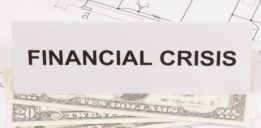American Household Borrowing at Record Business Expansion Levels, Right at the Cycle Peak
Never underestimate the ability of the populace to top-tick the market. American household borrowing is at current expansion highs, right as the business cycle peaks. Packing on large, additional debt can’t end well as the economy has only one possible direction to go from here—down.
The Federal Reserve Bank of New York is reporting that consumer debt levels rose 4.5% to $12.84 trillion through June 2017. Credit card debt rose 7.5% in two quarters! Mortgage debt rose 3.9%. Auto and student debt also increased, but at slower rates. (Source: “U.S. Households Borrow at Fastest Pace of Expansion, Fed Says,” Bloomberg Markets, August 15, 2017.)
Meanwhile, how long can the debt binge continue before debt servicing becomes an issue? In some ways, it already is.
Also Read: U.S. Mortgage Rates to Increase in 2017 – So Are the Risks of Another Housing Crisis
The number of 30-day delinquencies in four debt categories all increased. Credit cards saw the largest increase, up to 6.2% from 5.1% a year earlier. The reason? Credit standards are loosening once again. “This is occurring within the context of loosening lending standards, as borrowers with lower credit scores recover their ability to access credit cards,” said a New York Fed senior vice president, Andrew Haughwout, in a press release. (Source: Ibid.)
So here we go again, having learned nothing over the past decade. It was only 10 years ago that consumers were taking on record amounts of mortgage debt right when housing prices were cresting. Home owners were either too ignorant or disregarded how badly adjustable rates mortgages would hamper their future ability to pay. Since credit card rates are typically much higher than mortgages, consumers are playing with fire. When the inevitable recession comes, debt loads will be at their highest. That’s a bad combination.
Average Credit Card Interest Rates (APR) – 2017
| Card Type | Low | High | Overall |
|---|---|---|---|
| Travel Rewards Cards | 15.62% | 19.24% | 15.99% |
| Airline | 14.62% | 21.99% | 16.24% |
| Hotel | 15.24% | 21.99% | 16.12% |
| Business Credit Cards | 13.12% | 19.87% | 15.37% |
| Cash Back Credit Cards | 13.24% | 22.99% | 20.90% |
| Student Credit Cards | 13.99% | 22.62% | 19.80% |
(Source: “Average Credit Card Interest Rates (APR) – 2017,” ValuePenguin, last accessed August 17, 2017.)
Rising delinquencies are often an early indicator of financial stress. In turn, rising delinquencies can presage recession. Much like the proverbial canary in the coalmine, it’s correlated strongly with household balance sheet strength. The Federal Reserve monitors this number vigorously, as it’s a direct factor in the course of fiscal policy. The last thing the Fed wants is to raise rates too quickly into an imperiled consumer. Other factors come into play, of course. But a debt-embattled consumer’s ability to take on more debt is a high priority. It’s one of the leading factors that can trigger a recession.
As we’ve said time and again on Lombardi Letter, recession equals stock market crash. There’s no two-ways about it. Historic valuations cannot support the crashing earnings environment a recession brings about.
Rising delinquencies are just the tip of the spear. It they continue—with 70% of the gross domestic product reliant on consumer spending—the economy could get impaled on it.






